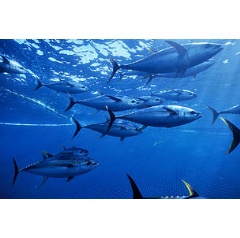Governments agree on multi-year conservation plan for Eastern Pacific tunas
The 21 governments responsible for collectively managing tuna fishing in the Eastern Pacific have taken steps to bring catches in line with scientific advice as part of a multi-year conservation measure, a decision welcomed by WWF at the conclusion of the latest Inter-American Tropical Tuna Commission (IATTC) meeting in Mexico City.
Beginning this year, governments will implement a 72-day fishing closure – an increase of 10 days – for every large-scale purse seine tuna vessel in the Eastern Pacific. In line with scientific advice for skipjack, yellowfin, and bigeye tuna populations, the closure will take place every year through 2020.
“This is an important step toward the sustainable management of this fishery and moving the region away from the pitfalls of relying on short-term conservation that needs to be renegotiated every year,” said Pablo Guerrero, WWF LAC Fisheries Director. “There is still a great deal of work to be done to address other contributors to overfishing, including excessive fleet capacity, and we still require continued scientific analysis of the impact of conservation measures on populations. Still, this kind of progress creates the momentum needed to move forward with the process of implementing harvest control rules and ensuring catches do not exceed limits.”
The new measure agreed to by IATTC members will also improve the management of fish aggregating devices, known as FADs, which are floating objects used by many fishing vessels to attract tuna in one spot rather than chasing after a school of fish. Most commercial purse seine vessels will be limited to deploying 450 FADs at any one time. Other vessels will be allowed fewer FADs based on their size. In addition, all vessels must begin reporting the movement of all objects so that scientists have access to the data. The measure also prohibits the placing of FADs 20 days before the closure, and the collection of FADs on which vessels have made sets, 15 days before the closure.
Despite calls for consistency with a measure in place on board vessels in the Western and Central Pacific, governments could not find agreement on security conditions to be provided for observers working on board tuna fishing vessels. The Western and Central Pacific Fisheries Commission has had a measure in place since 2015.
Guerrero added, “The safety of observers onboard tuna fishing vessels cannot be compromised. Commission members must come together to find consensus on providing the tools and rules that account for the safety of all observers. WWF will continue to give voice to the needs of the observer community and hold governments to account if they fail to meet the responsibility of safety for all at sea.”
Observers are important actors in the fishing management scheme. They live for weeks at a time on fishing vessels to collect and report back on important data about fishing operations. The IATTC has had observers onboard vessels since the late 70s.
-------
Notes
A harvest control rule is the pre-agreed management action taken in response to changes in the fishery and/or changes in abundance status in relation to reference points. The adoption of harvest control rules is a key aspect of modern fisheries management and is also a requirement of important eco-label certification programs such as the Marine Stewardship Council.
( Press Release Image: https://photos.webwire.com/prmedia/6/211760/211760-1.jpg )
WebWireID211760
This news content was configured by WebWire editorial staff. Linking is permitted.
News Release Distribution and Press Release Distribution Services Provided by WebWire.
